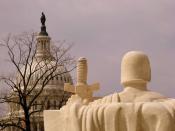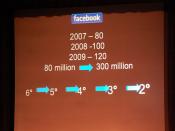Separation of PowersAlthough many people think that the Constitution leaves room for one branch of government to dominate the others, the Constitution actually lays a firm basis for the distribution of power. The argument that one part of the government could conceivably dominate the others would be a very good argument, could any credence be lent to it. The basis of this argument is a quote from Montesquieu. Montesquieu said, ÃÂThere can be no liberty, where the legislative and executive powers are united in the same personÃÂ or if the power of judging be not separated from the legislative and executive powers.ÃÂ What he meant is that no branch of government should have total control over another. He did not address the blending of powers of checks and balances. A partial mix of powers is actually a good thing; the absolute separation of powers would give each branch a measure of absolute power.
Therefore, the blending of powers is required. No branch of government should totally dominate any of the others but the system of checks and balances is needed. Most fears about the Constitution were centered on the executive, but, Madison says, ÃÂBecause we lessened the executive in fear of a monarch, it is the legislative that now has too much power.ÃÂ Although this statement might raise fears of an all-powerful legislature, those fears would be groundless. While the Constitutional powers of the legislative branch are more extensive with fewer limits that the others, the executive and judicial branches nonetheless have specific roles unique to them, so the legislature is not all-powerful. Although the branches of government may have some power over the appointment of members of the other branches, it is limited so that each branch is as independent as possible. By far the greatest security against having...



Needs more organization
I am not sure if this is part of a larger paper. It needs an introduction and conclusion
1 out of 1 people found this comment useful.